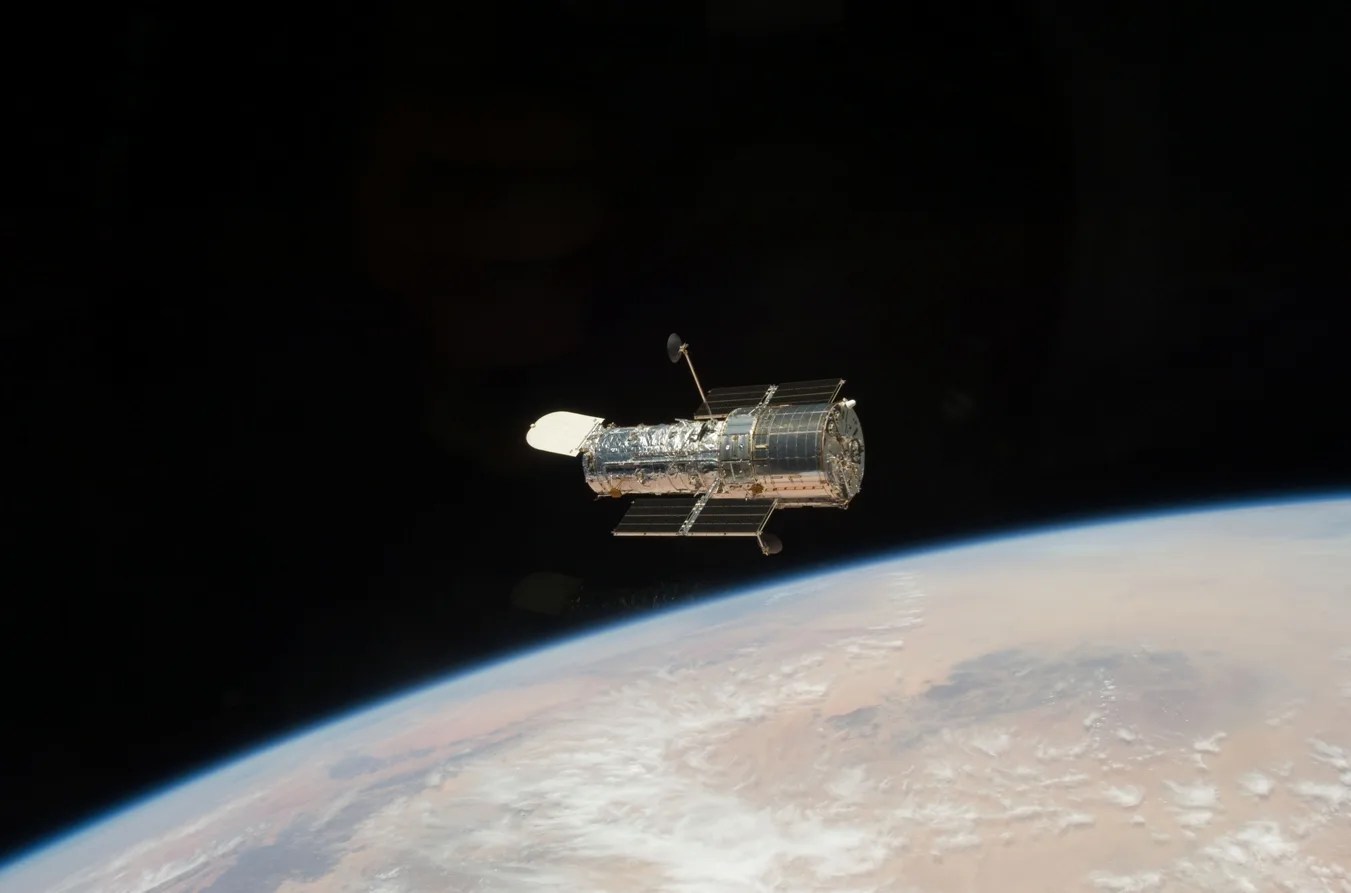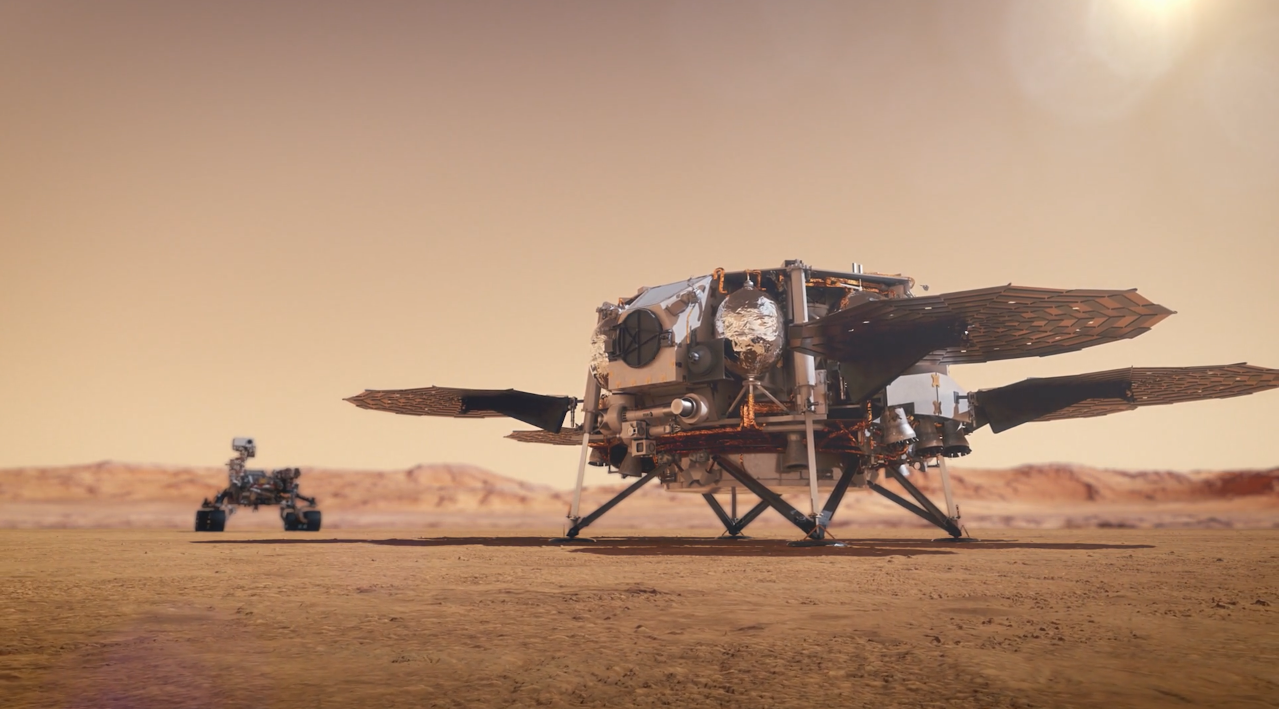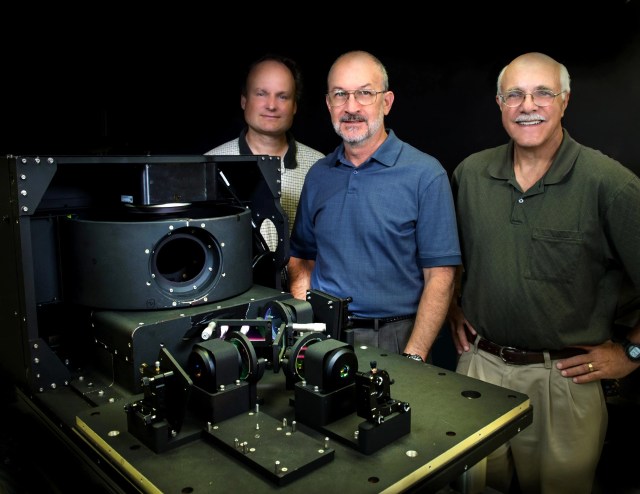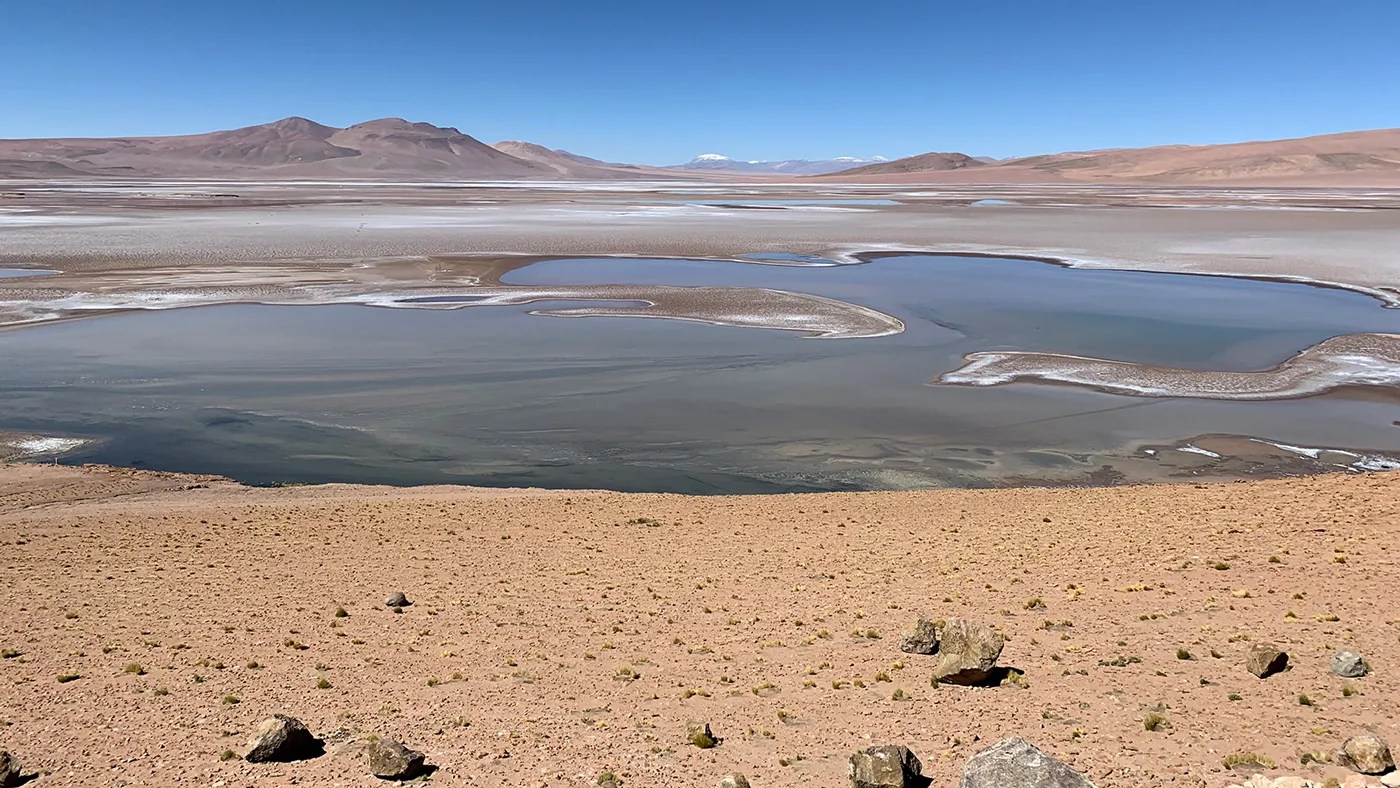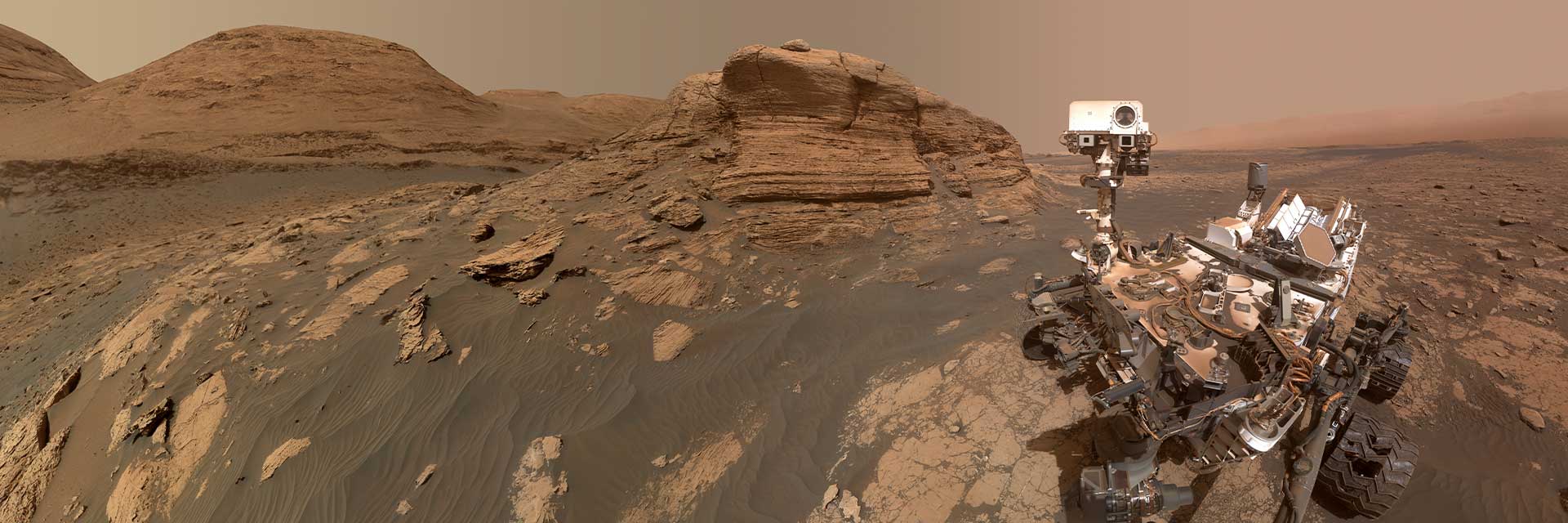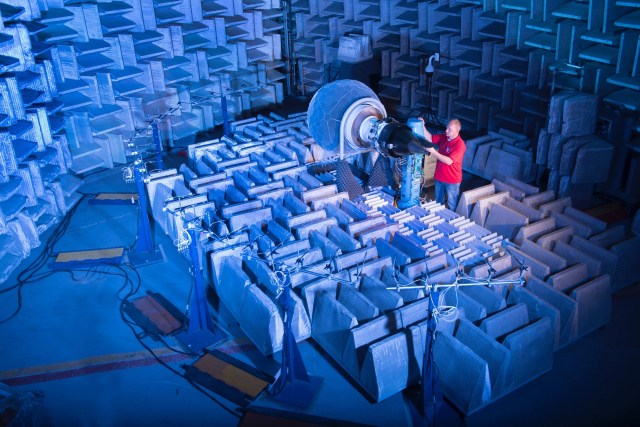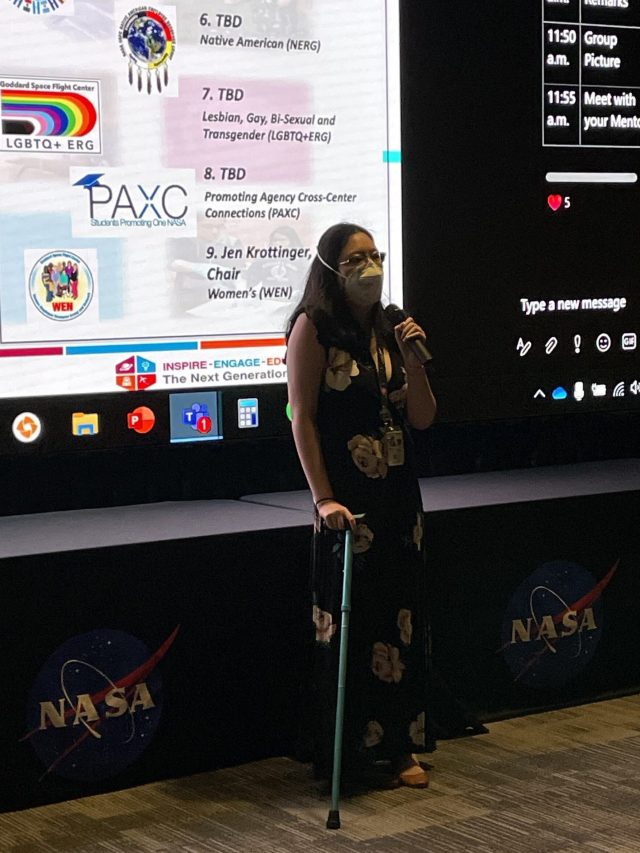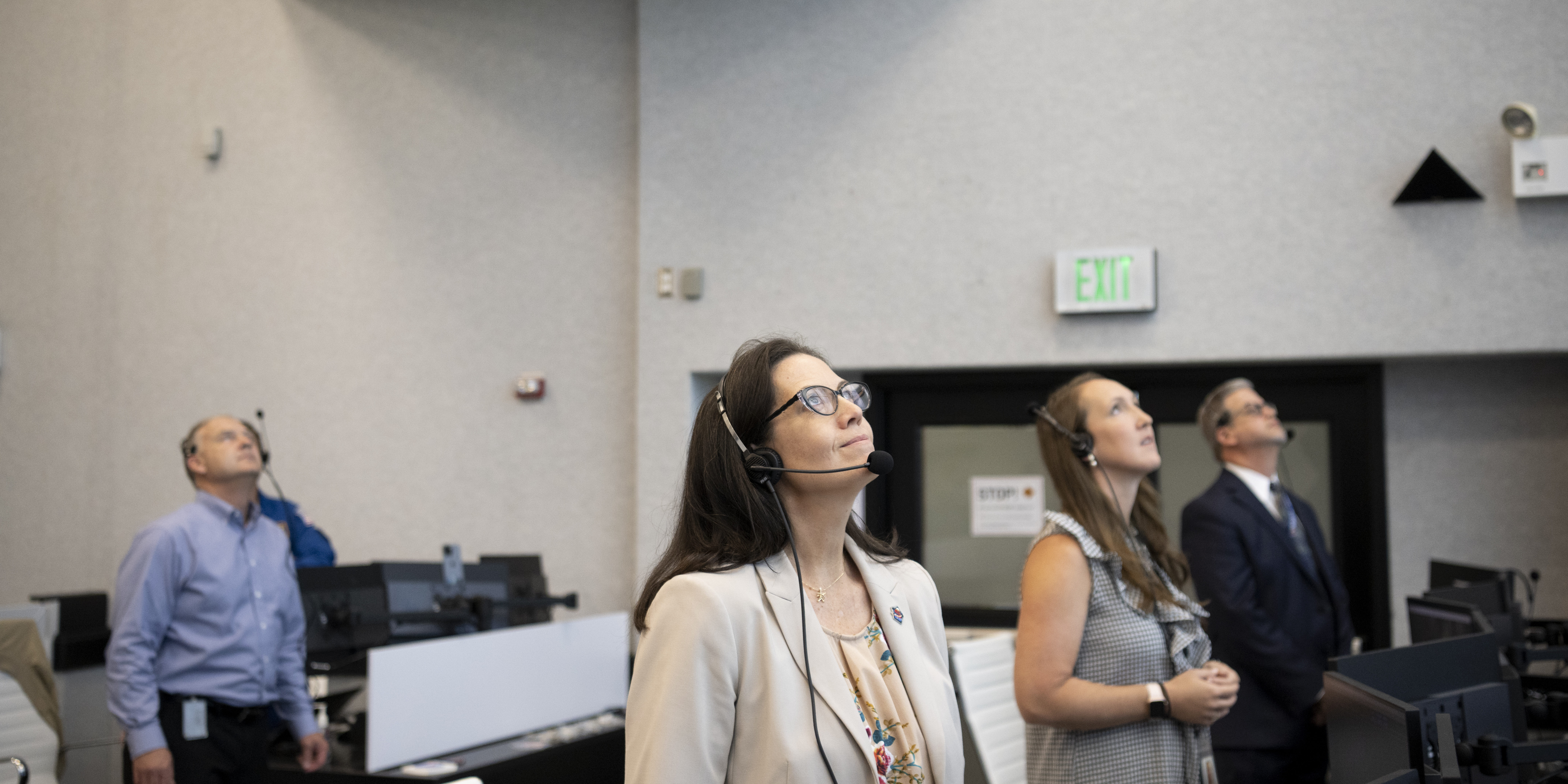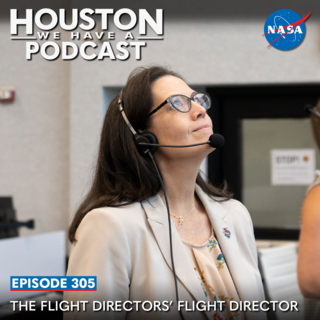
From Earth orbit to the Moon and Mars, explore the world of human spaceflight with NASA each week on the official podcast of the Johnson Space Center in Houston, Texas. Listen to in-depth conversations with the astronauts, scientists and engineers who make it possible.
On episode 305, hear from chief flight director Emily Nelson as she discusses her journey to NASA and what it takes to lead teams inside Mission Control Houston. This episode was recorded on August 16, 2023.
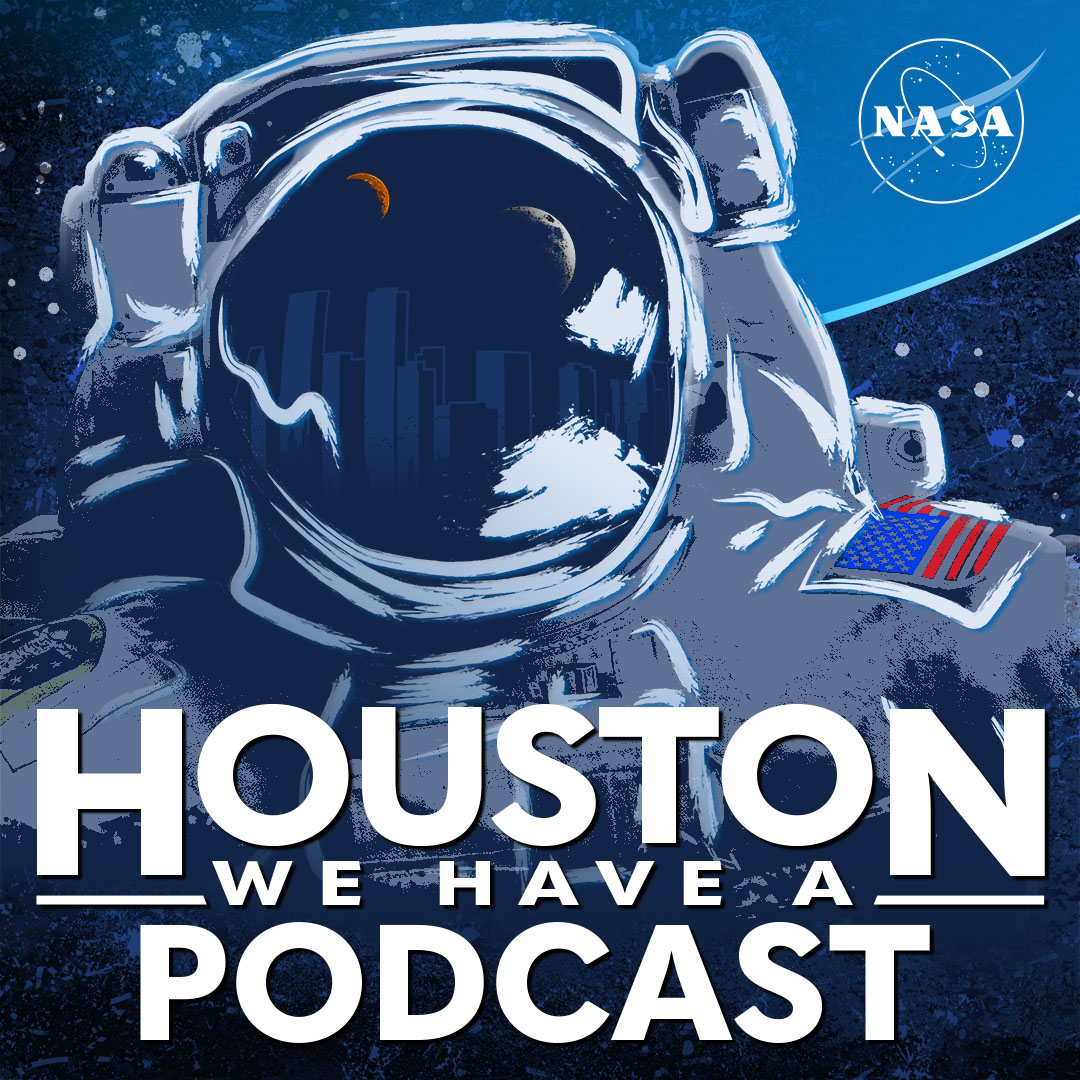
Transcript
Host (Gary Jordan):Houston, we have a podcast! Welcome to the official podcast of the NASA Johnson Space Center, Episode 305, “The Flight Directors’ Flight Director.” I’m Gary Jordan, I’ll be your host today. On this podcast, we bring in the expert scientists, engineers, astronauts, all to let you know what’s going on in the world of human spaceflight and more. In Mission Control Houston here at the Johnson Space Center, you have some of the brightest minds overseeing the complicated choreography that is human spaceflight. Many have seen the images and video of mission control during the Apollo 11 Moon landing, or the famous Apollo 13 mission that returned three astronauts home safely from a mission to the Moon after a critical hardware failure. And these images are hard to forget.
Mission control can be a very dynamic place with different conversations happening inside your headset and it can be especially chaotic during critical moments and problem-solving. But at the center of all the action is the flight director with the role of directing the team’s responses, asking for their expertise and recommendations, and proceeding with important decisions, all within a moment’s notice. It takes a special person to take on this responsibility. Now imagine the person that has the responsibility to lead 31 of these individuals. That person is Emily Nelson, now the chief flight director here at the Johnson Space Center, and we’re lucky to have her on this episode to learn about her journey and pick her brain on what it takes to lead some of the most talented people into the next era of human spaceflight. Let’s get started.
[Music]
Host: Emily Nelson, thank you so much for coming on Houston We Have a Podcast.
Emily Nelson: So excited to be here.
Host: Great to have you. How has the job been? Chief flight director and you’ve had the role for a little bit now. Do you feel settled in? You feel good?
Emily Nelson: Yeah, that first year is always, you know, a little bit figuring out what the job is, figuring out how you are going to do the job, even if you’ve been adjacent to the job for a while and so it’s been a really fun year and of course human spaceflight’s done a lot in that year, so it’s been pretty exciting.
Host: And it will continue to be exciting. We’re definitely going to talk about all the stuff coming up. Wanted to start by getting to know you a little bit and what got you to where you are right now. Of course, you spend a lot of time in flight operations, but going through your biography, it says you were born in Okinawa, Japan, raised in Austin. I guess you moved when you were a little girl—don’t really remember Okinawa too much.
Emily Nelson: Nope. Did get to go back and visit as a side trip after visiting with our JAXA (Japan Aerospace Exploration Agency) friends on one trip. So I have actually seen the island as an adult, which was nice.
Host: But Austin is home.
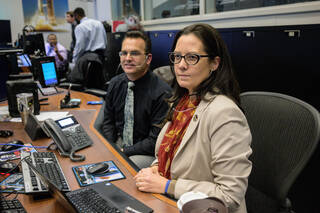
Emily Nelson: Austin is home.
Host: What was it like growing up?
Emily Nelson: Way different from what it’s like now.
[Laughs]
It was this, you know, sleepy town that had this wonderful mix of university and government and hippies and just a great place to learn. I happen to be really lucky that the school district in Austin was just amazing when I was coming up through school and so I just got one of the best educations that money could buy out of a public school district. I count myself really lucky and super grateful to all of those teachers that I benefited from so much through all of those years in Austin.
Host: So even early on, you were pretty sold when you were looking at education after high school, you pretty much knew you were going to UT Austin.
Emily Nelson: I knew I was going to college. I really wanted to get out of state. My mom worked for UT. My dad had gone to UT, you know what I mean? It’s kind of the school down the street. It’s funny, my dad would make fun of me because I didn’t realize how big UT was because it was just the school that I’d been hanging out at UT my whole childhood. So he took me to St. Edwards University in Austin and he said, “okay, this is a normal college, UT is strange.”
[Laughs]
So I applied to a couple other schools, but ultimately UT was just the best deal around. And so ended up sticking at home.
Host: Nice. Now, you could have gone several different directions when it came to continuing your education for college, but you decided to become an engineer. Was there something that maybe sparked that? Why pursue science? Why pursue engineering? Why go that route?
Emily Nelson: Well, it wasn’t the first choice. I had several majors before I got to mechanical engineering. When I started school, my intent was to become a math teacher. A friend of my moms who had a degree in math, actually from the University of Houston, a PhD in math from U of H, advised her that UT Austin’s math program is not where I wanted to go if I wanted to teach. It was all about actuarial sciences and that if I were really invested in teaching, I really ought to head to another school, like maybe U of H. I of course chose to ignore that advice. Shortly thereafter figured out that I wasn’t really enjoying the math program as much as I enjoyed math. Wandered around quite a bit and then eventually ended up in mechanical engineering.
Largely what drove me there was a realization. What I kept saying was, “I want to find a place where I can be creative, but in a more structured way.” If you just go and try to look at design, which is kind of where I went. Where at this giant university can I learn design? I went to the art school. I went to the School of Interior Design. I went to a lot of different places at the school, and I didn’t want the art version of design. I wanted something with more structure. I mean, I still had that math background and so I was really looking for a way to be creative and solve problems, but in a more rigorous environment than an artistic design environment—really, I’m not an artist so that wasn’t ever going to work. And so ultimately found that mechanical engineering was the right fit.
Host: It is interesting how you perceive that pursuit of creativity, right? You were leaning on your strengths. Your consideration for pursuing being a math teacher, going the route and thinking logically that having that structure… seems like you had a strong core. I guess you were naturally good even in high school at math?
Emily Nelson: Yeah. We had what we called the Science, Math and Computer Academy in Austin, a magnet program. That’s where I went to high school. So I had spent a lot of time studying even advanced math in high school. Again, one of the best school districts around cause I had some phenomenal opportunities before I ever got to college. And then I actually did a pass through the music program for a while and was a music major briefly. In hindsight, I could not have said it this way at the time, but ultimately I had to find the place where skill and passion overlapped because I had a reasonable amount of skill in a lot of different areas, but I had to find the place where I was willing to do the work because skill alone wasn’t going to get me where I wanted to go.
In the music program, I found I enjoyed music and I enjoyed rehearsal with other musicians, but I hated practicing. I hated practicing by myself, and I was never going to be good enough to make it as a professional musician if I wasn’t willing to put in that time and effort. And then fast forward a while, and I’m taking thermodynamics as a mechanical engineering student, and I’m having to put in hours of practice doing my thermo homework and having to do multiple problems to demonstrate that I’ve acquired the knowledge and I can do it without having to refer back to my notes or whatever. And at the end of those days, I wasn’t beat up, I wasn’t frustrated, I wasn’t sick to death of doing the homework. I mean, that was hard work and it’s not particularly fun, but it wasn’t not fun.
So finding the place where you’re willing to do even the least fun part of that, whatever it is, for all the hours that you’re going to have to put in to learn, where you’re willing to do the hard work to learn, where the learning is not the painful part, but a good reasonable part, is where I think of skill and passion overlap. You have to have some want, you have to be willing to put in the work; and it doesn’t really matter how much native skill you have if you’re not willing to take that native skill and add some work to it. So ultimately engineering was where I found that intersection and never turned back.
Host: What’s interesting in hearing about your path here is you’re sort of finding your way. You are analyzing your skills and finding your way and trying new things along the way. A lot of folks we talk to on this podcast have like an instant love of space. Something early in your childhood. Did you have that?
Emily Nelson: Not really. I went through a lot of “I want to be’s” when I was a kid and none of them were astronaut, engineer, scientists, none of those. At the same time, I grew up watching Star Trek and Star Wars and all of those and so getting the intersection of an opportunity to work in a creative environment, work in a problem-solving environment, where I also got to get us a few steps closer to everybody getting to live in space, that was pretty much a dream come true. But it wasn’t the purpose, it was the “let me figure out through this kind of winding path, the seeking path, what is it that I’m good at? What is it that I enjoy? What is it I’m willing to work at? What is it that makes me feel fulfilled now? Where can I apply that?” And turns out you could do all of those things in a space-related environment. A pretty much dream come true and I found a family here at JSC.
Host: Nice. So that’s how that happened because immediately after your bachelor’s, that was your first job, right? Here at NASA as a flight controller.
Emily Nelson: That’s right.
Host: So what were your first days like when you were here?
Emily Nelson:Hmm. First days… I mean, talk about drinking from a fire hose. I got here in the fall of ’98. So we were just about to launch the FGB (Functional Cargo Block), came straight into the thermal control systems group for space station. And we were in the midst of figuring out how to do all of the telemetry and commanding for the lab module at that point cause you have to stay several years ahead of whatever next mission you’re going to be doing. Really jumped in with both feet. I show up and they’re like, “okay, you’re going to be on the data team. So you get to figure out what all these parameters are, what they mean, how important they are, start sorting them and figuring out whether we ought to be looking at them or not, and whether we ought to be putting them on our displays and on the cruise displays.” I joke that in my first week, I was at my first ICAT at the ISS Command and Telemetry team meeting and just jumped right in. It’s really a lesson for me now as a senior leader that getting those opportunities to do real work right off the bat were really important to my development.
Host: So you hit the ground running absolutely. And you did so at first element launch. That’s really interesting. So you’ve looked back at your career and you have seen and operated the space station through its entire life.
Emily Nelson:For that FGB launch, I didn’t actually have a TV and of course I’m a brand-new employee, like have been here, I don’t know, maybe three months at that point. But I got up in the middle of the night, went over to a friend’s house who had a TV and watched the launch and watch it get into orbit, during the two-way mission where the node module showed up and was then docked to the FGB. And then I can remember going over to Space Center Houston for the post-flight, for the STS-88 mission, if I’ve got the numbers right, and just nearly crying watching the mating of those two. And then the EVA to ensure that the first two elements of the space station had come together and knowing that you just can’t take those apart. They’re never meant to come apart. And we were on our way. So it was really exciting.

Host: If you weren’t sold on human spaceflight by that time. That seems like a moment—
Emily Nelson: Yeah. You see that on the big IMAX screen and you’re pretty much here. You’re like, “okay. I made the right choice. I’m good.”
Host: And that really defines your career because you stuck with flight operations. There must have been something about it you loved because you were in flight operations pretty much your whole career, right?
Emily Nelson: I have been. I have the least interesting career of anybody, anywhere. I’ve only ever really had two jobs since coming here, since graduating. Again, it comes back to figuring out somewhere along the way. I love problem-solving. I love getting to have some opportunity to be creative and innovative and solution-finding. There is still an aspect of that in the job even now. Even though my job today is so radically different from the job I had at the very beginning, I joke—it is a joke—I feel like you almost have to have a little bit of attention-deficit disorder to do well in ops because the task switching, the something new every day, the something new every hour, the fact that not only are we problem-solving, but we’re solving a radically different problem every day. I’m not designing the same widget over and over and tweaking little things here and there. I’ve got an entirely different problem to solve. And now I’ve got an entirely different program to work for. So many different programs that we’re working with now in space because we are just in such an exciting time of NASA’s development that really, as you know, it’s one of those, “as long as you stay interested, as long as they keep you busy,” then you’re like, well, it doesn’t actually occur to me to go anywhere. And the problems keep coming and they’re still interesting and they’re still different every day. So still fun.
Host: A lot of people can get burnt out though, right? Not everybody gets that idea that this is fun, right? Because challenges are exactly that. They’re challenging and sometimes you can get overwhelmed by those things and sometimes you can second guess yourself and be less confident. So when you reflect on your approach, especially earlier in your career and as you were developing, when you encountered those challenges and worked through them and moved on to the next thing, what were some of the things you were taking into account as you were encountering those stressful moments?
Emily Nelson: First of all, don’t take yourself too seriously. I think humility is a key component to success in those types of environments. Mentorship is huge. We have historically done a really good job of that, especially in the Flight Operations Directorate or in the Mission Ops, as it was called when I started. We have a lot of catchphrases, right? One of them is “use your resources,” which is meant to be, if you have a problem and you’re not 200% sure, then go and phone a friend and go and consult with somebody. And if you are 200% sure, you probably really need to phone a friend because you’re probably—
Host: Overconfident, maybe.
[Laughs]
Emily Nelson: Not really, but you know, not only do you first have to know where all of your resources are, like how can I find information? How can I find information quickly? Whether that’s flight rules or schematics or design documents or phoning someone who has been working on this longer than you have so that you can consult with them. That’s an important piece of knowledge to have, knowing where to get the knowledge. And so you never feel like you’re flying without a net because you’re surrounded by a team of people, all of whom are all moving in the same direction towards the same goal, trying to accomplish the same thing. And so that helps a great deal when you realize—and it’s driven home early on—you’re part of a team. You’re not actually all by yourself. As a flight director, the buck may stop with me, and in a quick-solution environment where there’s a problem and it needs solution here in this next moment, I’m the one who has to make that decision. But I have a team of experts that are able to give me the best information they have available. And that’s what I use to make that decision.
So knowing that you’re part of a team, which is such a huge part of NASA culture, is an important part of that. Also just having access to folks who would be very open about how they’ve made mistakes and what they have learned from those mistakes and what they would do differently next time and being, again, humble enough to recognize if I don’t internalize other people’s lessons then I can make the same mistakes. So there’s a difference between “you just hear a war story and it’s a fun story” and “you hear a war story and you file it away and you try to actually match it up with an experience later” and say, “you know what? This is not unlike what my friends had to deal with five years ago. So maybe I’ll be careful about this particular aspect of this.” Really paying attention to the lessons that have been learned by the folks that are teaching you so that you can absorb all that information and make real use out of it. You know, having such a tremendously talented team, such a tremendously talented set of mentors and teachers has been key throughout.
Host: And it obviously didn’t scare you. You were absorbing a lot of these lessons. You talked about mentorship and there must have been something, maybe a previous flight director, somebody in that role and understanding the level of responsibility that you would eventually be taking on in your career. This is where we’re leading, right? You were a flight controller, you stayed in operations and you eventually made your way to flight director. There was something about that level of responsibility and that’s where you wanted your career to go. When you had this mentorship approach and when you were talking with some previous flight directors and understanding how they approach things, what was it that really sold you that “this is the direction I want to go in my career?”
Emily Nelson: Is it not PC (politically correct) to say that it wasn’t necessarily obvious that it was the right way to go?
[Laughs]
Host:Yeah, that’s a good point.
Emily Nelson: So not to reveal too much, but I didn’t necessarily know for sure that I wanted to be a flight director. There were times when that didn’t look like a terribly attractive job. Cause it is a lot of hard work and because you see your friends go ahead of you. I had a number of coworkers who became flight directors. So then I had kind of access to them while they were going through the early flight director stages, learning how to be a flight director, learning who they were going to be as flight directors. And that’s hard work, like turning yourself into that leader, even if you have all the skills, there’s kind of a slight difference between having the skills and knowing how to learn and knowing how to put all those pieces together and then figuring out how you want to lead and how you fit into that big picture.
I would say that I then saw all of those folks get through the hard part of that learning process and come out the other side and they all loved their jobs and it’s absolutely the best job in the world, as every former flight director will tell you in no uncertain terms. So I got a little bit of encouragement along the way to try and so I actually applied three times. The third time is when I got selected. I had a number of mentors along the way. I mean, you know, the leaders in the office—well, I thought of them as the leaders, I didn’t really know the chief back then—but Jeff Hanley was our 4A lead flight director and he was a really great mentor. Phil Engelauf, another great mentor, was my flight director on the STS-112 mission. You just have a lot of folks along the way giving you encouragement, not telling you how to do it, not telling you what you need to do to get there. Just encouraging you to continue to seek and continue to learn and continue to grow. And if it works out, it works out. And if it turns out that that’s the right path, then you’ll end up in the chair.
Host: So by the time you actually did get selected and you were thinking about that, knowing that mentality, how long did it take you from the time that you were selected as flight director to the time that you said, “this is the best job in the world?”
Emily Nelson: Oh, like a minute and a half.
Host: Really? It was almost instant?
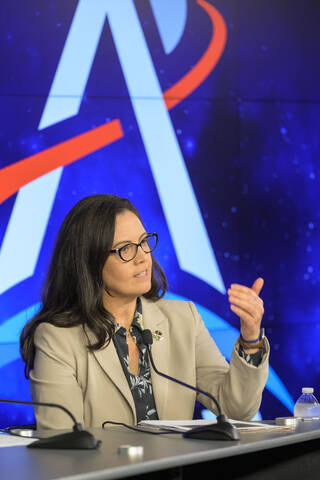
Emily Nelson: I mean, I knew that there would be hard times coming cause I had cheated, I had watched my friends go through it. But I knew I’d come out the other side. Even when it gets hard—I mean, anything worth doing is hard. Sure, at the beginning you’re reading a lot of books cause now you were meant to be the world’s expert in one system and now you’ve got to be not a world’s expert, but you’ve got to know enough to ask smart questions about all the systems. So there’s a lot of learning, a lot of sitting around with books. I had not done that in a very long time.
[Laughs]
I would go to my mentor and beg her, “please give me something to do, something productive to do. Please. I’m so tired of reading flight rules.” The flight directors end up reading all of the flight rules three times in the process of their training program, and the flight rule book, I’m holding my hands up right now, is like two feet tall. And that’s like pages. The book is two feet tall. It’s a huge book. We actually printed one out for the last class and I was like, “here you go.”
[Laughs]
Host: Slam it on the desk. “Learn this.”
Emily Nelson: Just three times. Just three times.
[Laughs]
So, I mean, it was hard. It’s harder when you realize you’re not actually in charge of the world. Cause there’s this mythos about, you know, “the flight director is large and in charge.” Well, we’re really just a very technical facilitator that’s bringing people together to accomplish a goal. And sure, in the moment, in mission control, when everything is going wrong and the space station is trying to fall apart or Orion is trying to fall apart, our job is to keep the team focused and get the mission successful and get the crew home safe. But there’s a ton of times where really, all we’re trying to do is get everyone to the table to solve a problem together. And we don’t have a whole lot of authority, like written authority, to get that done. We just use a number of different techniques to get the best out of everybody we’re working with to try to provide the best solution we can to the programs we’re working for.
Host: There’s that humility you were talking about.
Emily Nelson: It’s also truth. But in reality, we’re just hardworking leaders who have spent a lot of time learning and building trust with the variety of stakeholders as a formal term that we’re working with. If a flight controller comes in all starry-eyed and gets selected as a flight director and thinks that they’re going to be God here in about two years, then in about two years they’re going to be really disappointed. If you come in knowing that that’s not true, then you have a slightly easier time.
Host: And then it becomes the best job in the world.
Emily Nelson: Exactly.
Host: If you reflect on your time as a flight director, and what I’m trying to pull out here is like a story, a moment. You talk about hard times, and you were in mission control for decades, so you must have something that you reflect on that was a difficult moment, that was a challenging decision where all eyes were on you. Do you have something that maybe comes to mind, what that decision was and what you learned from it?
Emily Nelson: I mean, the one that comes to mind is where I made what in hindsight, I consider to be a bad decision. When you realize that it was a wrong decision is when you’re having a really hard time in the moment you’re making the decision, you don’t know that it’s the wrong decision yet. I was an increment lead for the first time…second time?
Host: Early.
Emily Nelson: Early; and we were talking about doing some maintenance in the airlock on the space station, changing out a valve. What could go wrong? But it’s a valve in the airlock of the space station with the 15A mission coming in like six weeks to do a bunch of EVAs out of the airlock on the space station. It turns out that we should probably not have been attempting to do that maintenance task cause it did not go well. We ended up disabling an oxygen port in the airlock to the extent that we ended up sticking a tuna can over the top of it, which stayed there for the next 10 years, until we finally, many years later, managed to fix it.
I was so excited that we finally fixed my mistake. But really, I mean, in the bigger scheme of things, it sounds like no big deal. We obviously figured out how to work around it, but you just feel like I let my program down. Like they were counting on me to exercise good judgment and only put forward the task that wouldn’t do harm. That would only make life better. And instead, we tried an activity that left the space station in a worse configuration than when we started that day. And you just feel like a failure. And it didn’t help that the flight director leading the mission that was about to go through their readiness reviews and was now having to figure out how to execute all of those EVAs without access to O2 was like, “what have you done to me?”
Host: Oh no.
Emily Nelson: I was like, “dude, I’m so sorry. I’m so sorry. I’m going to put a tuna can over it. Does that help?”
[Laughs]
So we obviously worked our way through it. It was not the end of the world. Part of it is realizing at the end of the day, resilience is an enormously important thing. And so at the end of the day, you’ve got to shake it off and you’ve got to take start the next day and you’ve got to keep making decisions and you have to do it all over again and trust that you’re surrounded by a bunch of smart people and we’re going to figure out how to work around this. But that was probably the one that comes to mind, I didn’t help the space station that day and it wasn’t all on me, but I take responsibility because that’s my job.
Host: I tend to do that, too. I reflect on things like a bad decision, but it can be a powerful learning moment and it is funny that the learning moment from that was an approach to how to make decisions and what happens when the next failure comes. You’re in mission control for 20 plus years. You’re going to make mistakes. So how do you get through that when you still have to be the person that everybody’s counting on? You can’t fall and just say, “oh, I’m not good enough,” and walk away. You kind of have to brush yourself off and still be the person that everybody can turn to and trust for that guidance.
Emily Nelson: Yeah. When I do tours of mission control, usually they’re looking at the space station flight control room and I say, “well, we’ve got other flight control rooms in this building” and down the hall we’ve got folks who are doing simulation training. And I joke that, you know, the phrase we’re known for is, “failure’s not an option.” But the only way you get into the room where you get to do the real work is if failure’s the only option. Because in sims, the whole point is to drive until you fail so that you learn how to dust yourself off, pick yourself up, and do it again, and learn from that mistake and never make the same mistake twice. And so failure is an enormously important part of our learning process. And at least in flight ops, one of the things we drive home really early is making the mistake is not the problem. Not acknowledging the mistake would be the problem. You have to be willing to learn from the mistake, talk about the mistake, help other people learn from the mistake so that we don’t repeat mistakes. We’ve got enough bad mistakes in our corporate history. We don’t want to repeat anything. And so the failure’s an enormously useful tool. You just want to use it in the right places.
Host: I’m going to go back to this theme—which I keep going back to—that humility. I think to be a person that recognizes failure and is open to the criticism and say, “you know what, I failed and that’s okay. I’m going to learn from this and I’m going to move on” does take a certain level of humility, right? You don’t want that resilience and “I can’t make mistakes, I’m the boss” kind of thing. So it kind of is rooted in that learning from failures and moving on. You have to be a good leader, to be a good decision maker, there has to be a level of humility.
Emily Nelson: And somehow that’s easier in mission control and the simulator environment than like it is in your PA sessions. I know for me at least, I’m not great at receiving negative feedback. I’ve told my employees for sure, but I’ve also told my boss like, “I’m better if you just give me all the negative feedback and then let me go think about it for like a day. But don’t make me talk about it immediately. But if you let me think about it for a day, then I’ll internalize it. I’ll figure out how to be better, I’ll come back and then I can talk about it.” But I’m actually really terrible at taking negative feedback in the office environment. Over in the control center, we’re all conditioned to be able to take feedback anytime. But I mean, it’s funny to me how there’s a dichotomy there. Just because it’s important doesn’t mean it’s easy.
Host: Right. I’m the same way when I solicit feedback. I really want to learn. I really want to be that person. And then they tell me, and I’m like “what do you mean?”
[Laughs]
Emily Nelson:Right.
Host:So you have to take it in strides, right? And I like that idea of digesting. So, you’re flight director for a while. You build the experience, and you get the opportunity to become deputy chief. What was that like?
Emily Nelson: I was not at all sure that that was a good idea mostly because if you go into management then you don’t really get to flight director as much.
Host: Right. You don’t get the cool stuff.
Emily Nelson:As stated earlier, flight director job’s still the best job on or off the planet. Holly and I talked about it for a while. I actually gave her a lot of other options. I’m like, “hey, how about him? How about him? How about that one?” But ultimately, the mix of assignments in the office and every other thing at the time, it was just a good pairing. She and I also had been working together for 20 years. She was also a THOR. So I felt like we made a really good pair and I learned a lot in that process. It’s a really great opportunity to be adjacent to the chief job so you really understand what it is you’re getting into if you ever get to that point. Although I did tell her at first, “I’m willing to be your deputy, but I don’t want your job.” That took a while.
[Laughs]
Host: Here we are.
Emily Nelson:Yeah. It wasn’t too long. My memory is terrible, so I couldn’t even guess at how long, but it wasn’t too long before I realized as much as it was not cool to have to give up being a real flight director, getting another mission and another mission and another mission. I did get to hang on to some EVAs and that was fun. But getting to work every program—most flight directors work at least two—but the chief and deputy work all of them. I’m working with all of the Artemis programs, working with ISS, Comm LEO, CCP, Boeing, SpaceX, Sierra Space, Northrop Grumman… I get to work with everybody. I get to work with all the things. So talk about that task switching and something different every day, different every hour. Getting the opportunity to work through the entire portfolio of human spaceflight, I found way more rewarding than I had anticipated before I started the job.
Host: What perspective did it give you?
Emily Nelson: I’m a huge proponent that we—especially folks who are working Artemis missions—should be keeping an active role in LEO because LEO is where we’re actually flying spaceships every day. And those lessons are directly applicable to what we’re trying to figure out, how to do efficiently and effectively as we go back to the Moon and onto Mars. Really just seeing that there are themes across all of them, that all of these spacecraft have similar challenges, that if we pool our experience across all these different teams and across international partners and commercial partners, that we can come up with better solutions together. Being able to make those matchups, making sure that our Artemis team who’s working through SLS with ULA is working with our Boeing team, who’s working with ULA cause that’s the launch provider over there and they’re sharing information. And by the way, at ULA, we’re using some of the same people for both of those missions anyway, so you might as well complete the circle. You know, those kinds of things were just, again, it was just a new challenge, but just super rewarding to get to be involved in literally every different human spaceflight program.
Host:It means a lot hearing from you, your advocacy for low-Earth orbit cause it’s something that we press and we have the talking points for and we talk with a lot of experts to build those talking points and understand. But to hear from a person who has operated in low-Earth orbit for so long has an understanding of what it will take to operate on the Moon and can stress the value of continuing to practice, refine in low-Earth orbit to get us to the Moon. I feel like your perspective is stronger than most because you’ve been in low-Earth orbit for 20 something years, operating, learning, refining, and you understand the value of that for exploring.
Emily Nelson: Yeah. From an operations perspective, there are a lot of things that are different when you’re heading to the Moon versus when you’re in LEO. There’s no denying that. But a lot of the operational principles of the same. The challenges that we’re facing in low-Earth orbit today, where we’re starting to work with a lot of different companies who would like to create commercial spacecraft and we want to keep NASA busy. We still have a ton of research to do close to home without gravity as where we turn gravity into a variable instead of having it as a constant. There’s the mission of the space station is still important and eventually we’re going to have to let the space station go, although that’s going to break my heart. We need a “next,” like next is not only the Moon, next is also a lot closer to home cause we’re not finished yet. And if we really want access to space for everybody, then we got to keep developing in LEO. And a lot of those same problems, a lot of those same relationships with commercial providers, with international , crossing new boundary lines as we invite new partners, new global partners to participate, are going to carry over into our Artemis accords, are going to carry over into our Artemis missions. And in some ways a spacecraft’s a spacecraft. Like if you can operate a spacecraft in one domain, then you can operate a spacecraft in another. Not in every way. Don’t put a bunch of comments on this podcast saying that that’s not true. I know it’s not true in every way, but the lessons carry very well. And the truth is it takes a long time to get to the Moon. It takes even longer to get to Mars. So the flight rate when you’re going far, far away is going to be a lot lower. And so to keep your chops up, to stay current, to stay active, it helps to have a foot in both worlds.
Host: Okay. So that perspective is so important to hear. We’ve been talking about it a lot on this podcast and I absolutely love it. So you’re leading this charge in a sense, right now in this role. I wanted to stick with the deputy role for just a second because we recently got an opportunity to talk with Holly Ridings in her current capacity. We had her and Jon Olansen talk Gateway and she explained her relationship, the deputy manager relationship and how they kind of work together. She talked about her time with Dan Hartman, how they work together and there’s this complement to having those roles. If you were to describe your complement to Holly, cause you said Holly was saying, “I want you, I want you,” right? So she thought, I was thinking maybe—
Emily Nelson: Ah, I think she settled for me.
[Laughs]
Host: There’s that humility. But if you were to describe your leadership in a pair, your role as deputy, her role as manager of the flight director’s office and how you guys work together, how would you describe that?
Emily Nelson: You know, the advice she got when she started telling folks that she was going to have me be her deputy was, “oh, but you guys are too much alike. That’s not going to work out.” And, and I’m not sure all of those people really know how our brains work. Cause yes, we’ve been working together for a very long time and we work very well together, but we kind of come at problems in a very different way. She’s much more forward-leaning, much more excited about change, much more wanting to see change in results now. I’m much more naturally okay with change, but let’s make sure we’re changing the right thing. If we’re going to redo this, let’s make sure we’re not making a mistake. And so it’s not that I slowed her down, but there would just be questions where I’d say, “well what about this?” And it would maybe just slightly angle our trajectory in a slightly different way. I think the blend of the two was really good.
We also shared a lot of core values though, which I think was very important. We wanted to grow the team, we wanted to grow leaders. We wanted to make sure that we were doing everything we could to tend to the strategy and the strategic vision for not only our organization, but support the strategic vision of the agency. Artemis kind of came about while we were working together. Right? And to make that as successful as possible, how can we position the flight directors? How can we position the Flight Operations Directorate to best support these programs? And this vision for a Gateway that is serviced by an Orion and, and an HLS, which then allows us to get to the surface. And then we have the rovers that can build a city and how do we best support these things? At the highest level, I’d say she’s more of the big idea, strategic thinker. And I’m more of the, “okay, great, now how do we do that?” and the go figure out step-by-step. To get to that end point, where do we need to start and what do we need to do first and who do we need involved? It was a really good matchup.
Host: Do you have a deputy now?
Emily Nelson: I do.
Host: Does that deputy complement you in sort of the same way?
Emily Nelson: Yes. And one of our goals, Holly and mine, was for her to have a different deputy and for that to be a rotation so that there’d be a bunch of folks getting that experience and getting the opportunity to get to work all the programs, to get the supervisory experience, to get to run the organization. I’m going to say we failed at that cause I was her deputy the whole time.
[Laughs]
Through a fortuitous set of circumstances have so far managed to make that work. So I had a deputy for the first year and then I’ve switched out and I have a new deputy for the second year. My goal is that that’s a really good learning and leadership opportunity and it provides a great perspective and if people then want to turn that into, “hey, I want to be chief someday,” or “I want to go run a program,” or “I want to go do whatever,” that it’s a just a good opportunity to get that experience.
And so I do. My first deputy was very different for me and that was really great for me in my first year to be able to stretch myself as you’re trying to figure out transitioning from being a deputy, which is very responsive to a chief. And so the chief gets to set the tone and then the deputy fills in the blanks. And so being able to, as I’m now, I’m the chief, so now how am I going to do this job? How am I going to define the way this job is done? It was really nice to have somebody who was super talented, super able to do both my job and his, providing me all the support that I could ask for and stretching me in directions that I wouldn’t naturally go so that I could kind of explore the bounds of my comfort zone and a little past the comfort zone and really get that opportunity, that first kind of dynamic-defining year. This year I’ve got a deputy who’s really devoted to taking stuff off my plate. And that’s going to be super interesting. This personality test, a class I did not too long ago, and it turns out that I’m a personality that doesn’t like handing things over to other people much. And so this is going to be the challenge this year, is figure out how to kind of build a system where I do less detailed work than I used to do and so that, again, I think we’ll be working on something different every year because it’ll be a new partnership with each deputy.
Host: It’s kind of fun hearing like your progress and how you still are developing and growing and that’s just important to I think any career. I skipped a step. You mentioned that when you were taking on the deputy role and you were talking with Holly, you said, “great, but I don’t want your job.”
Emily Nelson: True.
Host: But now you have her job. How’d that happen?
Emily Nelson: So again, when we were first having that conversation, I did not anticipate how rewarding it would be to get to work all the different programs. You then also spend, in this case five years, tending to this organization of people and caring very much about the development of each of them and building a trajectory for both the flight director office and participating in the trajectory for flight ops as a whole and wanting to continue that trajectory. And so largely, I really wanted the job to continue what we had started. There are some small changes and big changes to make sure all flight directors are getting opportunities to grow and that the flight directors are fostering growth within the flight controllers and that we are growing the flight directors of the future and all of those kinds of things that in order for us to continue to be successful 20 years from now, we need to be working on now. Getting the opportunity to continue to do all of those things turned out to be important enough that I was willing to take the job.
Host: I think you have to love what you do, but it sounds like one of the key things that really sold you on this is loving the people that you work with.
Emily Nelson: Absolutely. I have the best team on the planet for sure.
Host:I was coming into this with the expectation of being the chief of some super highly capable people would be challenging. But the thing you said about everybody loving their job, that may take a burden off cause everybody kind of loves what they do. I don’t know if that’s your experience.
Emily Nelson:I think that’s a part of it. I remember joking with a former chief who was a mentor of mine. I was like, I think you have to be a crazy person to want to be the boss of like 30 Type A personalities, that you can’t be right in the head if you volunteer for that, right? That can’t be right. And I will say that when that stereotype, so this is before I was a flight director, right? And in that stereotype where you’ve got an office full of people who all think they’re God, then yeah, that would be a bit of a nightmare, right? My experience with flight directors, in flight ops in particular—and I think this is true across the center, I think this is true across the agency, which I think has been born out in all of these surveys that we take over the years—we’re a family. Like JSC is a village that happens to be just south of Houston. We take care of each other. And that’s certainly true at the larger level. But then as you get within individual groups, it becomes more and more and more true. So we are a family and the hardest part sometimes is when some of those family members are having trouble, you know, everybody has a life, or at least if I’m successful, all of flight directors have a life, right? So if somebody’s going through something, then that’s hard. Helping them through that is the good part, right? Or if somebody’s just beating their head against a wall because some issue is refusing to be resolved, you know, and getting to be there for them and help find the right resources and help find the right connections so that we can get through to the other side of any given problem.
So at the end of the day, in my experience, flight directors are thoughtful, knowledgeable, professional, caring individuals. And again, we are a team that is all aiming at the same goal with the same vision, trying to accomplish human spaceflight in a way that is safe and effective and sustainable, and growing teams together and growing each other and stepping aside if that means that that’ll help someone else get an opportunity for growth sometimes. I have not found it to be a—I don’t even know what Type A means if I’m entirely honest—but I have not found it to be some big group of Type A personalities. I have found it to be a group of lovely people that have been hugely supportive ever since I’ve gotten anywhere close to the office. Truly the best group of people to work with on or off the planet.
Host: Your proximity, you got to trust your word over, over any kind of perceived stereotype, right? You know the people best. So then what is your approach? What I mean by that is you’ve mentioned we are in a very exciting time. We have lots of things in low-Earth orbit. We’re talking about the Moon preparing for Mars, all of these commercial providers, international partners, there’s just a lot going on. And what you mentioned is how best to make sure that the flight directors have what they need, that they’re getting nurtured, that the flight controllers have what they need and they’re getting nurtured. So what is your approach to ensuring that success and making sure we are ready for what is probably going to be even a more dynamic future?
Emily Nelson: Right. Well, it takes consistent effort and I’m not always a hundred percent good at it; but, with the flight directors, figure out what they need to do the job and then get out of the way. And I’ll say that that’s possible because I communicate. I have bosses too and I have to know what’s going on and I have to understand what’s going on, which might take some time for you to get it through to me. Again, this group, this particular group of flight directors that I have the privilege of working with does a great job of keeping me informed in a timely way so that I can let them run, right? And I think I’m lucky in part because technology today makes that even more possible than it was 25 years ago. Like not long before I got here did we switch to personal computers in this place.
So the fact that my phone can talk to any one of them in four different ways is handy. Folks can drop an email or they can drop it in a chat or they can drop a text or they can call. So that communication helps a lot. And as long as I have enough information, then I work really hard to stay out of the details and let them work the details and let them have ownership and let them do what they do best, which is solve the problems of human spaceflight. I have found, and this frustrates me to no end, that the older I get, the harder it is for me to trust like that young, fresh out, who just showed up from college, and I have to remind myself, they threw me in the middle of this pile of data and said, “go figure it out and we’ll check your work, but go figure it out.” And that’s how I grew to be able to do this job and so a lot of it is also like, let’s find a way to trust the least experienced to get that experience. It’s not as much of a thing with flight directors because they already have a lot of experience by the time they become flight directors. But it’s a similar lesson, like you hired them to run spaceflight, let them go run spaceflight.
Host: Right. Don’t micromanage. Now we’ve gone through your career, we’ve gone all the way from growing up and deciding to become a flight controller to now your role as chief. If you reflect on going back to when you were that person and they threw you into that role and how you thought about problems and how you were, you know, back when you first started, jumping all the way to now and you wish you could tell that person some pieces of advice, what comes to mind?
Emily Nelson: I can’t even remember the advice I actually was given.
[Laughs]
Host: You did mention you have terrible memory and now I’m asking you to remember.
Emily Nelson: I’m never going to have a memoir. It’ll never happen because I don’t remember any of this. I try to remember the flights I’ve worked and I have to go to Wikipedia. I don’t know. I think I would go back to be careful not to take yourself too seriously,
Host: Full circle.
Emily Nelson: Just learn as much as you can. Maybe listen even more. Take as much advantage of all of these tremendously talented people. I probably stayed pretty close to home. I’m picturing my cubicles, right? I didn’t know a whole lot of the Shuttle guys a whole lot when I first showed up. And maybe, you know, go and ask them some questions. Go and learn a little bit, you know, off on the side about their experiences because you know, someday that’s going to be useful and valuable. And it’s a little bit like today, just cause you’re in station doesn’t mean you can’t understand Orion. You know, and understanding the challenges of the spacecrafts that are nearby is a really valuable experience. So I’d probably have encouraged myself to branch out a little, get to know more people so that you can get to know more of their experiences so that you can file that information away as well cause all of those experiences are valuable and can feed into a stronger future. I don’t know, I just think of my first branch chief back in the day, who pretty much taught me everything I needed to know about leadership. But there wasn’t a whole lot of words involved. It was all demonstration.
Host: Do you take that into your leadership style? Try to demonstrate.
Emily Nelson: I hope I do. I don’t honestly know. I’m going to have to go watch myself for a couple of months and see if I’m doing for the folks around me, what Quinn did for me.
Host: I think about that with leaders and emulating their behaviors. It can be a super powerful thing. They don’t need to say a word. You just understand what you like about their leadership style and you just try to emulate it.
Emily Nelson: Exactly.
Host: It could be a powerful thing. Emily Nelson, this has been awesome to talk with you and learn from your expertise, a leader of leaders. That humility, I think is going to be the theme for me that I walk away with. I think that’s a powerful thing to hold onto. That can keep you grounded and keep you pressing forward even through the toughest of times.
Emily Nelson: Keeps you grounded enough to launch.
Host: Hey, we have to end on that note. That’s awesome. Thanks, Emily.
Emily Nelson: Thanks very much.
[Music]
Host: Hey, thanks for sticking around. It was a pleasure getting to talk with Emily and pick her brain on what it takes to be a good leader. And that theme of humility, I think is something that will certainly stick with me. I hope you took something away from today’s conversation. You can check out more on everything that’s happening, all those different missions that the flight operations team is overseeing, all of them. You can explore more on NASA.gov. And of course, we have many podcasts, not just ours across all of NASA. They’re all listed at NASA.gov/podcasts. If you want to check us out, you can see our full collection there and listen to any of our episodes in no particular order.
On social media, we’re on the NASA Johnson Space Center pages, Facebook, X, and Instagram. Use #AskNASA on your favorite platform to submit an idea for the show, just make sure to mention is for Houston We Have a Podcast. This episode was recorded on August 16, 2023. Thanks to Will Flato, Dane Turner, Heidi Lavelle, Abby Graf, Belinda Pulido, Jaden Jennings, and Chelsea Ballarte. And of course, thanks again to Emily Nelson for taking the time for coming on the show. Give us a rating and feedback on whatever platform you are listening to us on and tell us what you think of our podcast. We’ll be back next week.


